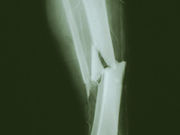Reduced hip and pelvic fracture risk compared to treatment with other antihypertensive medications
MONDAY, Nov. 21, 2016 (HealthDay News) — Thiazide-type diuretic therapy reduces hip and pelvic fracture risk compared with other antihypertensive medication therapy, according to a study published online Nov. 21 in JAMA Internal Medicine.
Rachel Puttnam, M.D., from Kaiser Permanente of Georgia in Atlanta, and colleagues examined hip and pelvic fracture hospitalizations in participants from the Antihypertensive and Lipid-Lowering Treatment to Prevent Heart Attack Trial randomized to first-step therapy with chlorthalidone, amlodipine besylate, or lisinopril. A cohort of 22,180 participants was followed for up to eight years during masked therapy. A total of 16,622 participants for whom claims data were available after trial completion were followed for up to five additional years.
The researchers found that 338 fractures occurred during the trial. On adjusted analysis, the risk of fracture was lower for participants randomized to chlorthalidone versus amlodipine or lisinopril (hazard ratio [HR], 0.79; 95 percent confidence interval [CI], 0.63 to 0.98). Participants randomized to receive chlorthalidone versus lisinopril had a significantly lower fracture risk (HR, 0.75; 95 percent CI, 0.58 to 0.98), while the risk was not significantly different for those receiving amlodipine (HR, 0.82; 95 percent CI, 0.63 to 1.08).
“These findings from a large randomized clinical trial provide evidence of a beneficial effect of thiazide-type diuretic therapy in reducing hip and pelvic fracture risk compared with treatment with other antihypertensive medications,” the authors write.
Two authors disclosed financial ties to the pharmaceutical industry; several pharmaceutical companies provided study medications, including Pfizer, which also provided financial support for the study.
Full Text (subscription or payment may be required)
Editorial (subscription or payment may be required)
Copyright © 2016 HealthDay. All rights reserved.








